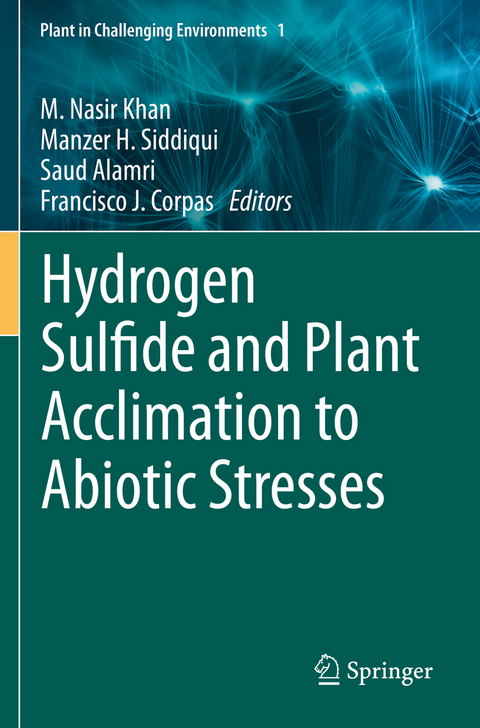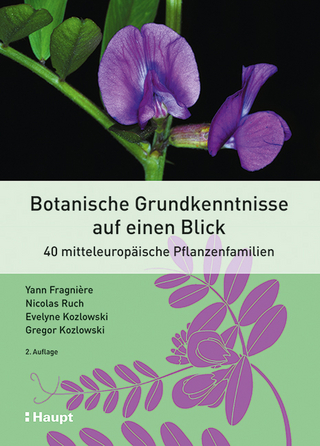
Hydrogen Sulfide and Plant Acclimation to Abiotic Stresses
Springer International Publishing (Verlag)
978-3-030-73680-4 (ISBN)
This book focuses on the role of hydrogen sulfide in the protection of plants against abiotic stresses and abiotic stress-induced complications by the way of converging advanced key methods of proteomics, genomics, and metabolomics. It provides an update on the biosynthesis, signaling, and mechanism of action of hydrogen sulfide in combating abiotic stresses in plants. Also, special emphasis is given to the interaction of hydrogen sulfide with other signaling molecules (such as nitric oxide, carbon monoxide, hydrogen peroxide etc.), phytohormones, mineral nutrients, ions, and ion channels in plants.
This work, uniquely, covers key aspects of hydrogen sulfide signaling in relation to abiotic stresses in plants, including programmed cell death, stomatal movement, and fruit ripening.
lt;p> Dr. M. Nasir Khan received his Ph.D. in Botany from Aligarh Muslim University in Aligarh, India, with a specialization in Plant Physiology. After completing his Ph.D., he was awarded research associate by the Council of Scientific and Industrial Research (CSIR), New Delhi, India, and environmentalist of the year 2011 by the National Environmental Science Academy (NESA), India. Dr. Khan is currently serving as an Associate Professor at the University of Tabuk in Saudi Arabia. His research focuses on the mechanisms of abiotic stress tolerance in crop plants. Dr. Khan has completed several research projects and published research papers and review articles in prestigious international journals and edited two books with Springer publishing.
Dr. Manzer H. Siddiqui is working as an Associate Professor in the Department of Botany and Microbiology, King Saud University, Saudi Arabia. Dr. Siddiqui has more than 17 years of research experience in crop production with special emphasis on the management strategies of different fertilizers and plant growth regulators. He explored the role of signaling molecules (nitric oxide and hydrogen sulfide) in plant growth and metabolism under abiotic stress. He is also interested in unveiling the physiological and molecular basis of mechanisms of tolerance of plants to different environmental stresses. Dr. Siddiqui has published nearly 120 research and review articles in peer-reviewed journals and also edited two books.
Dr. Saud Alamri completed his M.Sc. and B.Sc. degrees from King Saud University Riyadh, Saudi Arabia. He did Ph. D. from the University of Western Australia in the year 2014. At present Dr. Alamri is working as Assistant Professor at King Saud University Riyadh, Saudi Arabia. He is working on the plants in association with abiotic stresses. Much of his studies have been focusing on the physiological and molecular responses of plants to different environmental stresses. Dr. Alamri has published many research articles in high-impact peer-reviewed journals. He has also presented his research at prestigious conferences and published several abstracts. Additionally, he is actively engaged in teaching and training bachelor, master, and doctoral students.
Prof. Francisco J. Corpas is a Research Professor of the Spanish National Research Council (CSIC) who has more than 28 years of research experience in the metabolism of Reactive Oxygen, Nitrogen and Sulfur Species (ROS, RNS, and RSS, respectively) in higher plants under physiology and environmental stress conditions. Special interests are the implications of these reactive species in fruit ripening and the nitro-oxidative metabolism of plant peroxisome. He was the Head of the Department of Biochemistry, Cell and Molecular Biology of Plants (2014-2018) at Research Institute named "Estación Experimental del Zaidín"-CSIC, Granada Spain. He has already published more than 224 refereed research papers/review articles in peer-reviewed journals (according to Scopus database with h-index: 63) and edited seven books.
Chapter 1. Hydrogen sulfide on the crossroad of regulation, protection, interaction and signaling in plant systems under different environmental conditions.- Chapter 2. Hydrogen sulfide: A road ahead for abiotic stress tolerance in plants.- Chapter 3. Functional interaction of hydrogen sulfide with nitric oxide, calcium, and reactive oxygen species under abiotic stress in plants.- Chapter 4. Hydrogen sulfide and redox homeostasis for alleviation of heavy metal stress.- Chapter 5. Effect of hydrogen sulfide on the osmotic adjustment of plants under different abiotic stresses.- Chapter 6. Hydrogen sulfide and stomatal movement.- Chapter 7. Hydrogen sulfide and fruit ripening.- Chapter 8. Hydrogen sulfide impact on seed biology under abiotic stress.- Chapter 9. Hydrogen sulfide signaling in the defense response of plants to abiotic stresses.- Chapter 10. A transcriptomic and proteomic view of hydrogen sulfide signaling in plant abiotic stress.- Chapter 11. Cysteine and hydrogen sulfide: a complementary association for plant acclimation to abiotic stress.- Chapter 12. Hydrogen sulfide and posttranslational modification of proteins: a defense strategy against abiotic stress.
| Erscheinungsdatum | 02.09.2022 |
|---|---|
| Reihe/Serie | Plant in Challenging Environments |
| Zusatzinfo | X, 238 p. 16 illus., 12 illus. in color. |
| Verlagsort | Cham |
| Sprache | englisch |
| Maße | 155 x 235 mm |
| Gewicht | 427 g |
| Themenwelt | Naturwissenschaften ► Biologie ► Botanik |
| Schlagworte | abiotic stress • Cysteine • gasotransmitter • Hydrogen sulfide • Sulfur |
| ISBN-10 | 3-030-73680-6 / 3030736806 |
| ISBN-13 | 978-3-030-73680-4 / 9783030736804 |
| Zustand | Neuware |
| Informationen gemäß Produktsicherheitsverordnung (GPSR) | |
| Haben Sie eine Frage zum Produkt? |
aus dem Bereich


